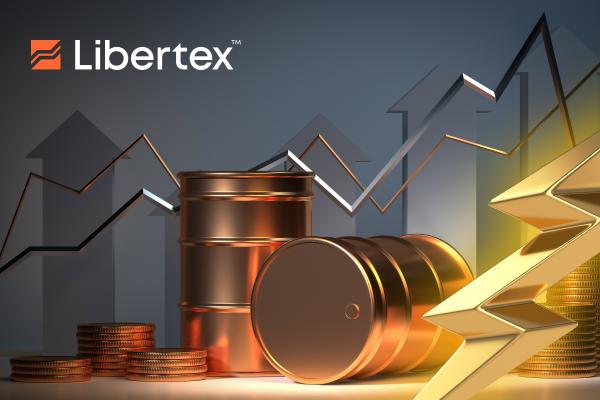Despite the green revolution, oil and gas are still staple commodities the world over. When their prices move, it affects ordinary people and investors alike. After a manic 2022 in the wake of rising tensions in Eastern Europe that saw Brent oil shoot up to near ten-year highs above $125 a barrel, prices eventually normalised back down below $80 per barrel. At the same time, spot natural gas prices on the open market exploded over 1000% as European Dutch gas prices increased from an average of less than €20 per MWh to a high of €338.54 in August 2022 before gradually dipping back down to around €30 per MWh this past summer.
Now, however, the price appears to have entered a new uptrend amid Russian and Saudi production cuts coupled with an uptick in political instability in the Middle East. And though crude prices have corrected downwards slightly since then, there is a clear dynamic towards the upside. Meanwhile, the Natural Gas EU Dutch TTF is up over 50% since then to €45 per MWh at the time of writing on 10 October 2023, having gained over 15% in the last month alone. As the heating season approaches, consumers and market participants alike are bracing for further price hikes both in oil and natural gas on typical demand-driven factors. If, however, we see an escalation in the ongoing conflict, then prices could be even further impacted.
OPEC+ in the spotlight again
In the wake of last year’s price hikes, all eyes have been on OPEC and its associated nations, with the cartel having huge control over oil price dynamics. It has been widely noted that two of the biggest producing nations — Russia and the Kingdom of Saudi Arabia — have committed to voluntary production cuts of 300,000 and 1 million barrels per day, respectively. These pledges have now been extended to 2024, and with demand expected to increase due to various factors, from increased industrial output in China to seasonal pressures, this artificial reduction of supply is only going to exacerbate any organic upward price movement.
In its latest forecast report, OPEC has raised its long-term demand outlook to 116 million bpd by 2045, which would require $14 trillion worth of investments to satisfy. Clearly, this means that the cartel sees a significant future for the energy resource and will do everything it can to maintain high prices in order to see a return on this sizable capital outlay. In the short term, it’s hard to predict where prices are headed. That said, OPEC seems intent on doing all it can to keep crude prices in the $80-100 range, which would make premium varieties, such as Brent, WTI and Light Sweet, all good value for longer-perspective investors at their present prices of $86.20, $84.28 and $84.25, respectively.
What about Washington?
The American Petroleum Institute noted that US crude oil stockpiles swelled by about 12.9 million barrels this week, which was much higher than the 500,000 barrel increase predicted by a poll of Reuters analysts. This has helped to ease some of the spiking effects brought about by the troubles in Israel and production cuts elsewhere. But, in addition to being a significant oil and gas producer in its own right, as the world’s leading superpower, the US has major influence on the energy market beyond simple supply and demand flows.
When looking to the long term, its environmental policy is liable to have an immeasurable global impact on demand for fossil fuels. As we head into the 2024 US Presidential Election, we find ourselves at a policy crossroads. Incumbent Joe Biden is very much committed to the net-zero agenda, while his major rival, Donald Trump, is much more laissez-faire in terms of environmental concerns.
Trump infamously took the US out of the UN Paris climate agreement and is now pledging to remove clean water and air pollution protections while fast-tracking environmental reviews of dozens of major energy and infrastructure projects, such as drilling and fuel pipelines. Biden, on the other hand, made his first acts in office back in 2021 to rejoin the Paris climate agreement and revoke permits for the Keystone Pipeline. Since then, he has invested billions in green infrastructure and renewable energy and set a goal for the US to be net zero by 2050. Clearly, then, oil’s fortunes from 2024-2028 will depend largely on who wins the presidential election, and investors would do well to watch the polls closely ahead of any major position changes.
Trade oil and more CFDs with Libertex
As a CFD broker with many years of experience connecting ordinary retail traders and investors with the financial markets, Libertex is a name you can rely on for competitive terms and conditions. Libertex’s CFD model allows you to trade long or short with no need to own the physical underlying instrument.
Libertex offers CFDs from a wide range of asset classes such as stocks, commodities, forex, crypto and, of course, oil and gas. Our platform allows you to open long or short positions in crude oil CFDs like Brent, WTI, and Light Sweet, as well as the US flagship natural gas fund, the Henry Hub. And best of all, you can keep your entire diverse portfolio in one place: the multi-award-winning Libertex trading app.

